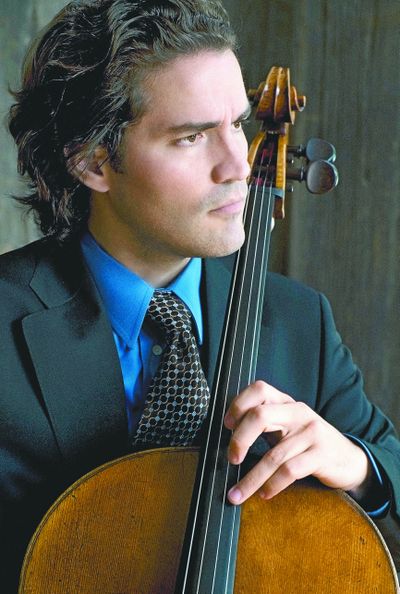Instrumental encounter
Cellist Zuill Bailey brings emotional voice to concerts with Spokane Symphony

Zuill Bailey’s first run-in with the cello was a literal one when he was just 4 years old.
“One day after a concert, I went running backstage, and I knocked a cello out of this girl’s hand and broke the neck,” Bailey said. He was raised in a musical family – his mother is a pianist, his father is a music educator and his sister is a violinist – and shortly after the incident, he was given a small practice cello.
“I sat down behind this little cello, and it was the first time my parents could remember me sitting silently with my eyes shut,” Bailey said. “I would play these open strings and sit there in awe of the sound. I was just smitten by the cello from the very beginning.”
Growing up in the Washington, D.C., area, Bailey was surrounded by classical music, and he was inspired to become a professional musician by Russian cellist Mstislav Rostropovich, who was the musical director of D.C.’s National Symphony Orchestra when Bailey was young.
“Someone told me when I was 11 or 12, ‘Some of the best advice I can give you is to find what you love to do and have that be your life. You’ll never work a day in your life,’ ” Bailey said. “And I thought about it for about a split second, and I realized music and this way of life was something that brought me true happiness and fulfillment.”
Bailey would go on to study music at the Peabody Conservatory and earn his master’s degree in cello performance at Juilliard. He has played with orchestras all over the world, and he even had a recurring role on the HBO series “Oz,” playing a cellist imprisoned for murder. He is currently the artistic director of the community organization El Paso Pro Musica and the Sitka Summer Musical Festival in Alaska and is a professor of cello at the University of Texas at El Paso. He’s been a frequent visitor to Spokane lately, performing the past two years at the Northwest Bach Festival and the Mozart on a Summer’s Eve concerts in Manito Park. He’s the Bach festival’s new artistic director, replacing the retiring Gunther Schuller.
This weekend, Bailey will be playing two shows with the Spokane Symphony, accompanying the orchestra on performances of Robert Schumann’s Cello Concerto and P.I. Tchaikovsky’s Variations on a Rococo Theme.
“There’s something very introspective and intimate about the Schumann concerto,” Bailey said. “He’s one of the most gorgeous writers of classical there ever was. I mean, he kind of led the way to romanticism.
“And the Tchaikovsky’s an interesting one,” he added. “His idol was Mozart, so he kind of tried to pay tribute to Mozart but with the flavor of Tchaikovsky. So you’ve got the pristine elegance of Mozart’s style with the flair and fire of Tchaikovsky. And that is a wonderful combination for crowds.”
Because the musical range of the cello is similar to that of the human voice, Bailey says he approaches a concerto the same way a singer might an aria. “The thing I try to do the most is to make it a vocal instrument,” Bailey said. “I try to sing on the cello every time I play it. It’s such an earthbound instrument – I don’t like every sound to be pretty or every sound to be rough. I like it to have the variables and the variety in it.”
“Zuill’s challenge is one that we, as an orchestra, work on all season: to break down the barriers between audience and performer,” symphony conductor Eckart Preu said. “He has that rare ability to help 21st-century concertgoers experience the joyous emotions, the highs and lows, of great classical music.”
Although he always tries to channel his unique voice through his instrument, Bailey said the key to his success as a classical musician is that he lets the composers speak for themselves.
“My biggest hope is that I try to communicate the beauty of what any given composer wanted to convey,” he said. “And it’s a fine line: How do I process and interpret this music with my flavor without getting in the way or distracting from the piece? I always try to be very genuine and honest with the music making, and yet also tell a story through my eyes.”